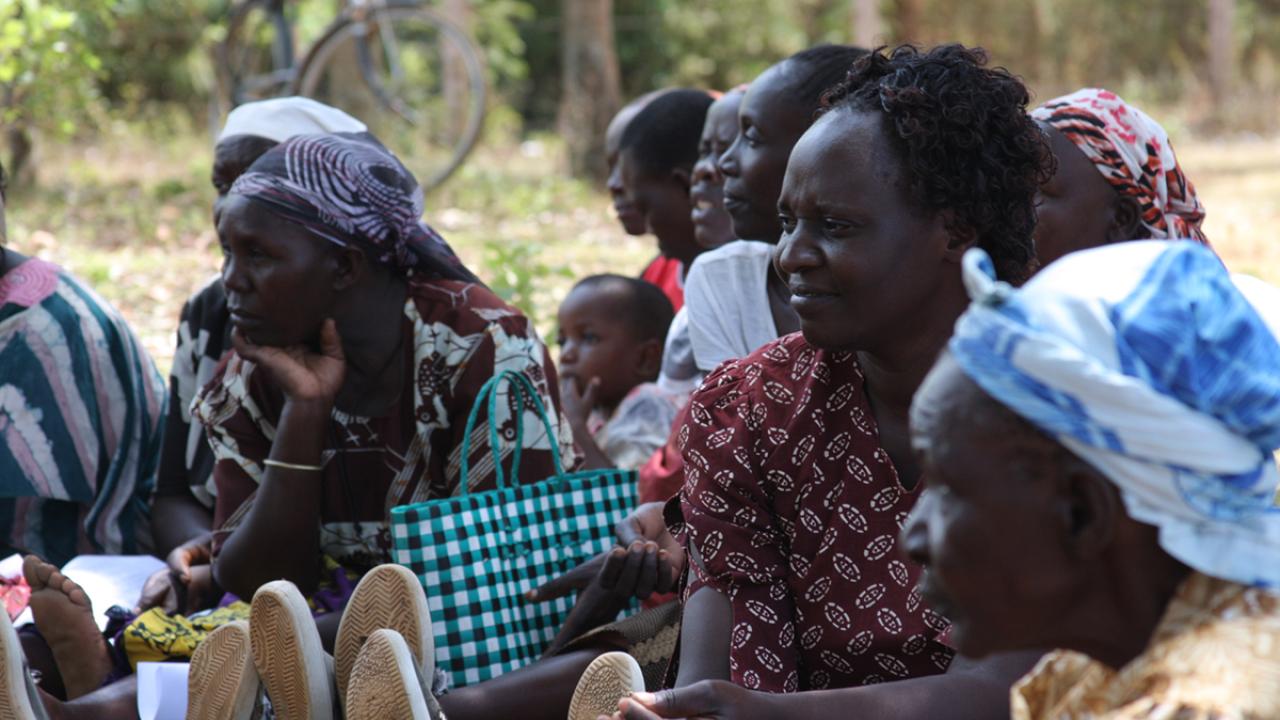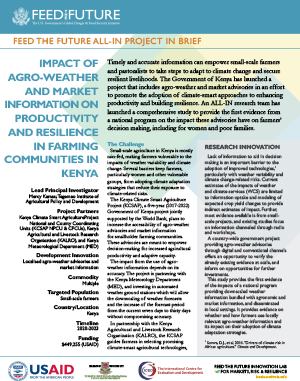
Timely and accurate information can empower small-scale farmers and pastoralists to take steps to adapt to climate change and secure resilient livelihoods. The Government of Kenya has launched a project that includes agro-weather and market advisories in an effort to promote the adoption of climate-smart approaches to enhancing productivity and building resilience. An ALL-IN research team has launched a comprehensive study to provide the first evidence from a national program on the impact these advisories have on farmers’ decision making, including for women and poor families.
Project Overview
Lead Principal Investigator: Mercy Kamau, Tegemeo Institute of Agricultural Policy and Development
Project Partners: Kenya Climate Smart Agriculture Project National and County Coordinating Units (KCSAP NPCU & CPCUs), Kenya Agricultural and Livestock Research Organisation (KALRO), Kenya Meteorological Department (MED), Virginia Tech
Development Innovation: Localized agro-weather advisories and market information
Commodity: Multiple
Targeted Population: Small-scale farmers
Country/Location: Kenya
Timeline: 2021-2024
Funding: $449,255 (USAID)
The Challenge
Small-scale agriculture in Kenya is mostly rain-fed, making farmers vulnerable to the impacts of weather variability and climate change. Several barriers keep farmers, particularly women and other vulnerable groups, from adopting climate adaptation strategies that reduce their exposure to climate-related risks.
The Kenya Climate Smart Agriculture Project (KCSAP), a five-year (2017-2022) Government of Kenya project jointly supported by the World Bank, plans to increase the accessibility of agro-weather advisories and market information for smallholder farming communities. These advisories are meant to empower decision-making for increased agricultural productivity and adaptive capacity.
The impact from the use of agro-weather information depends on its accuracy. The project is partnering with the Kenya Meteorology Department (MED), and investing in automated weather ground stations which will allow the downscaling of weather forecasts and the increase of the forecast period from the current seven days to thirty days without compromising accuracy.
In partnership with the Kenya Agricultural and Livestock Research Organization (KALRO), the KCSAP guides farmers in selecting promising climate-smart agricultural technologies, innovations and management practices (TIMPs) for their agro-ecological zones and priority value chains. Farmers also receive support for micro-projects that aim to increase incomes and diversify livelihood strategies with a view to reducing their exposure to climate change-related risks.
An ALL IN research team led from Tegemeo Institute of Agricultural Policy and Development, Egerton University, is evaluating KCSAP’s intervention to build the first evidence from a large-scale public program providing agro-weather advisories and market information to strengthen agricultural productivity and community resilience. This multi-faceted study is measuring the impacts these advisories have on productivity and household wellbeing, how farmers perceive and value them, as well as how to improve access to them particularly for women and other vulnerable groups.

Research Design
To build a strong foundation of evidence across multiple research questions, the study applies mixed methods. To assess the relevance and suitability of TIMPs in mitigating the impacts of climate risk, the team is using survey and satellite data to measure communities’ exposure to risks as well as the potential of TIMPs in reducing their vulnerability. To evaluate how farmers use the advisories and their overall satisfaction, the team is analyzing data generated by the KCSAP and qualitative surveys.
To assess impact, the study uses a randomized experiment which includes 840 households across nine counties in agro-ecological zones with high volatility in agricultural production, vulnerability to climatic shocks and poverty. Of these, 160 households are randomly selected to each of the four treatment groups and compared with 200 households in the control group that receives no treatment. Assigning farmers to each group at random makes it possible to see strong connections between the treatments and changes observed in the outcomes.
The four treatment groups and control group receive:
- T1: Agro-weather advisories via short (SMS) text messages only
- T2: Agro-weather advisories via short (SMS) text messages plus training to interpret and use the advisories
- T3: Agro-weather advisories via short (SMS) text messages and interactive voice response
- T4: Agro-weather advisories via short (SMS) text messages and interactive voice response plus training to interpret and use the advisories
- Control: Agro-weather advisories transmitted via print, TV and radio only.
Development Impact
This study will produce the first evidence from a country-wide government project that includes agro-weather advisories and market information. The results will show their impact at scale, making it possible to compare investments in agro-weather advisories with other public investments such as fertilizer and input subsidies. The study’s approach and findings are applicable to other countries in the region that are faced with risks emanating from climate change.
The study will also inform how to make agro-weather advisories more accessible to smallholder farming communities. In addition to wellbeing outcomes, this study will provide evidence on whether agro-weather advisories require direct communication like text or interactive voice messaging and training in addition to low-cost mass media communication. Findings from this study can ensure that investments in reaching rural communities with agro-weather information have the strongest impacts.
This report is made possible by the generous support of the American people through the United States Agency for International Development (USAID) cooperative agreement 7200AA19LE00004. The contents are the responsibility of the Feed the Future Innovation Lab for Markets, Risk and Resilience and do not necessarily reflect the views of USAID or the United States Government.
